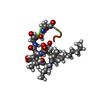+ Open data
Open data
- Basic information
Basic information
| Entry | Database: PDB / ID: 8s8n | ||||||
|---|---|---|---|---|---|---|---|
| Title | NMR structure of tanniamide in micellar DPC solution | ||||||
 Components Components | Tanniamide | ||||||
 Keywords Keywords | SURFACTANT PROTEIN / Non-ribosomal polypeptide / Cyclic lipodepsipeptide / Antimicrobial peptide / Biosurfactant | ||||||
| Function / homology | : / polypeptide(D) / polypeptide(D) (> 10) Function and homology information Function and homology information | ||||||
| Biological species |  Pseudomonas ekonensis (bacteria) Pseudomonas ekonensis (bacteria) | ||||||
| Method | SOLUTION NMR / molecular dynamics | ||||||
 Authors Authors | Kovacs, B. / Geudens, N. / Martins, J.C. | ||||||
| Funding support |  Belgium, 1items Belgium, 1items
| ||||||
 Citation Citation |  Journal: Adv Sci / Year: 2025 Journal: Adv Sci / Year: 2025Title: Higher-Level Structural Classification of Pseudomonas Cyclic Lipopeptides through Their Bioactive Conformation. Authors: Kovacs, B. / Prasad, D. / De Roo, V. / Vanheede, M. / Muangkaew, P. / Madder, A. / Hofte, M. / De Mot, R. / Geudens, N. / Martins, J.C. | ||||||
| History |
|
- Structure visualization
Structure visualization
| Structure viewer | Molecule:  Molmil Molmil Jmol/JSmol Jmol/JSmol |
|---|
- Downloads & links
Downloads & links
- Download
Download
| PDBx/mmCIF format |  8s8n.cif.gz 8s8n.cif.gz | 53.1 KB | Display |  PDBx/mmCIF format PDBx/mmCIF format |
|---|---|---|---|---|
| PDB format |  pdb8s8n.ent.gz pdb8s8n.ent.gz | Display |  PDB format PDB format | |
| PDBx/mmJSON format |  8s8n.json.gz 8s8n.json.gz | Tree view |  PDBx/mmJSON format PDBx/mmJSON format | |
| Others |  Other downloads Other downloads |
-Validation report
| Arichive directory |  https://data.pdbj.org/pub/pdb/validation_reports/s8/8s8n https://data.pdbj.org/pub/pdb/validation_reports/s8/8s8n ftp://data.pdbj.org/pub/pdb/validation_reports/s8/8s8n ftp://data.pdbj.org/pub/pdb/validation_reports/s8/8s8n | HTTPS FTP |
|---|
-Related structure data
| Related structure data |  8q1lC  8s2aC  8s2bC  8s2cC  8s2dC  8s4lC  9epsC C: citing same article ( |
|---|---|
| Similar structure data | Similarity search - Function & homology  F&H Search F&H Search |
| Other databases |
|
- Links
Links
- Assembly
Assembly
| Deposited unit | 
| |||||||||
|---|---|---|---|---|---|---|---|---|---|---|
| 1 |
| |||||||||
| NMR ensembles |
|
- Components
Components
| #1: Polypeptide(D) | Mass: 1385.603 Da / Num. of mol.: 1 / Source method: isolated from a natural source Details: 1) The polypeptide chain of tanniamide consists of 12 amino acids. 2) The N-terminal amino acid (DLE) is acylated with an (R)-3-hydroxy-dodecenoic acid (DEA) moeity which is indicated as the ...Details: 1) The polypeptide chain of tanniamide consists of 12 amino acids. 2) The N-terminal amino acid (DLE) is acylated with an (R)-3-hydroxy-dodecenoic acid (DEA) moeity which is indicated as the first residue. (double bond between the 5th and 6th carbon atoms) 3) The side-chains of the 2TL4 and 28J5 residues are of allo-configuration. 4) The depsi bond is established between the GLU13 mainchain carboxyl and the 2TL4 side-chain OH group. Source: (natural)  Pseudomonas ekonensis (bacteria) / Strain: COR58 Pseudomonas ekonensis (bacteria) / Strain: COR58 |
|---|---|
| #2: Chemical | ChemComp-A1H5T / (~{ Mass: 214.301 Da / Num. of mol.: 1 / Source method: obtained synthetically / Formula: C12H22O3 |
| Has ligand of interest | N |
| Has protein modification | Y |
-Experimental details
-Experiment
| Experiment | Method: SOLUTION NMR | ||||||||||||||||||||||||||||||
|---|---|---|---|---|---|---|---|---|---|---|---|---|---|---|---|---|---|---|---|---|---|---|---|---|---|---|---|---|---|---|---|
| NMR experiment |
|
- Sample preparation
Sample preparation
| Details | Type: solution Contents: 1.82 mM tanniamide, 102.2 mM [U-2H] DPC, 90% H2O/10% D2O Details: Tanniamide was dissolved in the micellar solution of uniformly deuterated dodecylphosphocholine (DPC-d38). Solvent: 10 mM Na2HPO4/NaH2PO4 buffer at pH 7.4. Label: 1H / Solvent system: 90% H2O/10% D2O | ||||||||||||
|---|---|---|---|---|---|---|---|---|---|---|---|---|---|
| Sample |
| ||||||||||||
| Sample conditions | Ionic strength: 26 (buffer only) mM / Label: conditions_1 / pH: 7.4 / Pressure: 1 atm / Temperature: 310 K |
-NMR measurement
| NMR spectrometer | Type: Bruker AVANCE II / Manufacturer: Bruker / Model: AVANCE II / Field strength: 700 MHz / Details: Prodigy Cryoprobe |
|---|
- Processing
Processing
| NMR software |
| ||||||||||||||||||||||||||||||||
|---|---|---|---|---|---|---|---|---|---|---|---|---|---|---|---|---|---|---|---|---|---|---|---|---|---|---|---|---|---|---|---|---|---|
| Refinement | Method: molecular dynamics / Software ordinal: 1 Details: The lowest energy NMR structure issued from CNS was refined using unrestrained AMBER molecular dynamics simulations (against the ff14SB force field). Here, we modelled the interaction of a ...Details: The lowest energy NMR structure issued from CNS was refined using unrestrained AMBER molecular dynamics simulations (against the ff14SB force field). Here, we modelled the interaction of a single peptide molecule with an explicit dodecylphosphocholine (DPC) micelle. The representative peptide conformation of the trajectory (=refined structure) was selected using cluster analysis. Solvent model: TIP3P. Occasional too-close contacts present in the NMR structure ensemble (structures #2-#11) are fully removed during the AMBER moleculary dynamics refinement (structure #1). Side-chain outlier values for the 2TL4 residue are the results of the depsi bond. | ||||||||||||||||||||||||||||||||
| NMR representative | Selection criteria: closest to the average | ||||||||||||||||||||||||||||||||
| NMR ensemble | Conformer selection criteria: structures with the lowest energy Conformers calculated total number: 100 / Conformers submitted total number: 11 |
 Movie
Movie Controller
Controller



 PDBj
PDBj HSQC
HSQC